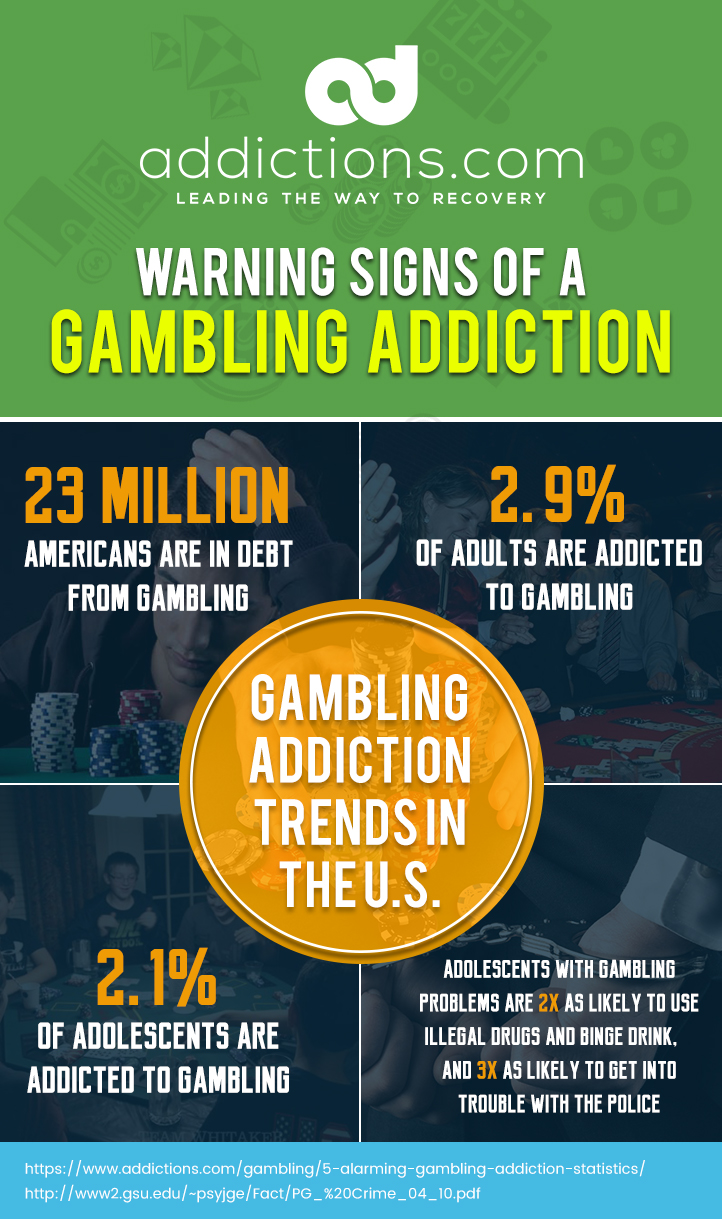If you feel you have a problem with gambling, or know someone who does, call (888) 696-2440 for free, confidential gambling addiction help. Signs and Symptoms of Compulsive Gambling. Compulsive gambling is a term that indicates that the person's gambling is compromising or damaging their personal, family, or vocational pursuits. A gambling addiction or problem is often associated with other behavior or mood disorders. Many problem gamblers also suffer with substance abuse issues, unmanaged ADHD, stress, depression, anxiety, or bipolar disorder. To overcome your gambling problems, you'll also need to address these and any other underlying causes as well.
The following are questions and information that may help determine if there is a gambling problem. SIGN 1: Time away. If I know the person is gambling, the amount of time spent gambling or engaged in gambling activities increases. The gambler can be gone for long unaccounted for periods of time. The signs of a gambling problem are often the same as the signs of other addictions. Common signs of addiction include, but are not limited to, the following: Feeling the need to be secretive about gambling Having trouble controlling gambling habits.
Gambling addiction isn't diffcult to determine. Here are the symptoms and signs of addiction to gambling.
What are the Signs of Gambling Addiction?
The fourth edition of the Diagnostic and Statistical Manual of Mental Disorders lists the following criteria for pathological gambling: preoccupation, tolerance, withdrawal, escape, chasing, lying, loss of control, illegal acts, risk of significant relationship, and bailout.
Preoccupation
One sure sign of gambling addiction is preoccupation. Preoccupation occurs when the gambler constantly thinks about gambling. He or she may frequently recall past gambling experiences. The gambler's life is now centered on gambling and how to acquire money with which to gamble. A preoccupied gambler may duck out of certain obligations and spend money designated for other purposes just to fulfill the gratification gained by gambling.
Tolerance
In the same way that a drug abuser can become tolerant of the substance that he or she is taking, one of the keys signs of a gambling addiction is the gambler becoming tolerant of gambling. The gambler becomes tolerant when he or she needs more and more money to achieve the desired sensation, just as a cocaine addict may need more and more cocaine.
Withdrawal: Another Sign of Gambling Addiction
Halting gambling may lead to withdrawal. This withdrawal may not come in a form as physical as the body's withdrawal from a substance, but a gambler suffering from withdrawal may experience agitation and irritability when he or she tries to gamble less or quit gambling altogether.
Escape
Pathological gamblers may also use gambling to escape from the world. They may be attempting to run away from their problems or to combat negative feelings of helplessness, guilt, anxiety, or depression.
Chasing
The gambling addict may also become a chaser of losses. In other words, when the gambler loses money, he or she returns the next day to try to gain it back or get even with the house.
Lying
You may have seen this sign of gambling addiction. Gambling addiction can lead to lying to both family members and friends about how the gambler is getting the money to gamble and the amount of time he or she is spending gambling.
Loss of Control
If you or a loved one has tried over and over again to stop gambling, this may be a sign that you have lost control to your gambling addiction and need to seek help. (more information about gambling addiction help)
Illegal Acts
Many compulsive gamblers become so in need of funds for their addiction that they resort to stealing—through larceny, fraud, or embezzlement—in order to continue their habits.
Risk of Significant Relationships
Another of the gambling addiction symptoms is how the gambler's relationships are affected, including jobs, personal relationships, educational opportunities, and so forth.
Final Gambling Addiction Sign: Bailout
A final symptom of gambling addiction is relying on others for monetary support for financial problems created by gambling.
Sources:
- DSM IV - American Psychiatric Association
- GamblingResearch.org

next: Do You Have A Gambling Problem?
~ all gambling addiction articles
~ all articles on addictions
APA Reference
Gluck, S. (2009, December 22). Signs of Gambling Addiction, HealthyPlace. Retrieved on 2020, December 31 from https://www.healthyplace.com/addictions/gambling-addiction/signs-gambling-addiction
For the most part, gambling is a social and recreational activity enjoyed by the majority of gamblers without any problems. However, there are a number of people who have significant gambling problems, causing harm to both themselves and important people in their lives. For yourself and those around you, it's important to understand how to spot the signs that someone has a gambling problem.
As an employee in the gaming industry, it is your responsibility to provide an environment that is safe and supportive for everyone who takes part. That means offering assistance where needed and information about how problem gamblers can receive the kind of support services that may require.

By undertaking a RCG (Responsible Conduct of Gambling) course, you will be armed with the skills and knowledge to detect problem gamblers in the premises where you're employed. You will be taught how to offer advice for those individuals to get the help they need if they so choose. Most venues will have their own code of conduct that must be approved by their state's gambling regulation body, and will provide guidance for interacting with those who are showing signs of problem gambling.
Signs of a problem gambler
Amongst the thousands of patrons participating gambling, there are a number of tell tale signs that can ihelp to detect a problem gambler.
1. Playing regularly
Anyone who plays regularly, such as more than once a week on gaming machines, or spends long periods of time in the one spot (i.e. gaming machine) or venue is an indication of a gambling problem. Skipping meals or taking time off work to continue gambling are further key signs.
2. Changes in behaviour
There are several ways in which problem gamblers can exhibit behavioural cues that indicate problem gambling, such as:
- Sudden changes in behaviour, with patrons moving from pleasant to offensive in an instant.
- Poor anger management and abusive language.
- Violent outbursts against others, either in person at the venue, or on the phone to a betting outlet.
Signs He Has A Gambling Problem
3. The blame game
Blaming others for their losses, or claiming the games are rigged to lose. Problem gamblers often declare that a specific object (i.e. gaming machine, horse, football team) owes them a win.
4. Outward signs of stress
Physical cues include perfuse sweating, crying, frustration and shaking. This could culminate in a verbal and/or physical outburst of a violent nature, or feelings of guilt and remorse.
5. Gambler's fallacy
Often known as chasing the win, gamblers believe a win is just around the corner after a string of losses. Problem gamblers will continually gamble to try and recover their losses, which could culminate in betting larger amounts of money andtaking more risks.
6. Borrowing money

This could include asking other patrons in the venue to borrow money, asking the venue to provide credit, or trying to sell personal belongings to patrons to raise additional gambling funds.
7. Sharing personal problems
Problem gamblers are four times more likely to have a drinking problem [Link to the article – ‘What are some of the key facts about gambling in Australia?'] . Alcohol lowers inhibitions and people are more likely to share personal information with you, such as an inability to pay bills, relationship problems, or stories about past gambling wins.
8. Lying and seclusion

next: Do You Have A Gambling Problem?
~ all gambling addiction articles
~ all articles on addictions
APA Reference
Gluck, S. (2009, December 22). Signs of Gambling Addiction, HealthyPlace. Retrieved on 2020, December 31 from https://www.healthyplace.com/addictions/gambling-addiction/signs-gambling-addiction
For the most part, gambling is a social and recreational activity enjoyed by the majority of gamblers without any problems. However, there are a number of people who have significant gambling problems, causing harm to both themselves and important people in their lives. For yourself and those around you, it's important to understand how to spot the signs that someone has a gambling problem.
As an employee in the gaming industry, it is your responsibility to provide an environment that is safe and supportive for everyone who takes part. That means offering assistance where needed and information about how problem gamblers can receive the kind of support services that may require.
By undertaking a RCG (Responsible Conduct of Gambling) course, you will be armed with the skills and knowledge to detect problem gamblers in the premises where you're employed. You will be taught how to offer advice for those individuals to get the help they need if they so choose. Most venues will have their own code of conduct that must be approved by their state's gambling regulation body, and will provide guidance for interacting with those who are showing signs of problem gambling.
Signs of a problem gambler
Amongst the thousands of patrons participating gambling, there are a number of tell tale signs that can ihelp to detect a problem gambler.
1. Playing regularly
Anyone who plays regularly, such as more than once a week on gaming machines, or spends long periods of time in the one spot (i.e. gaming machine) or venue is an indication of a gambling problem. Skipping meals or taking time off work to continue gambling are further key signs.
2. Changes in behaviour
There are several ways in which problem gamblers can exhibit behavioural cues that indicate problem gambling, such as:
- Sudden changes in behaviour, with patrons moving from pleasant to offensive in an instant.
- Poor anger management and abusive language.
- Violent outbursts against others, either in person at the venue, or on the phone to a betting outlet.
Signs He Has A Gambling Problem
3. The blame game
Blaming others for their losses, or claiming the games are rigged to lose. Problem gamblers often declare that a specific object (i.e. gaming machine, horse, football team) owes them a win.
4. Outward signs of stress
Physical cues include perfuse sweating, crying, frustration and shaking. This could culminate in a verbal and/or physical outburst of a violent nature, or feelings of guilt and remorse.
5. Gambler's fallacy
Often known as chasing the win, gamblers believe a win is just around the corner after a string of losses. Problem gamblers will continually gamble to try and recover their losses, which could culminate in betting larger amounts of money andtaking more risks.
6. Borrowing money
This could include asking other patrons in the venue to borrow money, asking the venue to provide credit, or trying to sell personal belongings to patrons to raise additional gambling funds.
7. Sharing personal problems
Problem gamblers are four times more likely to have a drinking problem [Link to the article – ‘What are some of the key facts about gambling in Australia?'] . Alcohol lowers inhibitions and people are more likely to share personal information with you, such as an inability to pay bills, relationship problems, or stories about past gambling wins.
8. Lying and seclusion
Problem gamblers will lie to everyone about their whereabouts, take phone calls outside so as not to giveaway their location, and withdraw from socialising with others. They may even ask employees to lie on their behalf should they receive phone calls from people asking if they're at the venue.
9. Concentration
Becoming so engaged in the betting activity, such as gaming machines, that they have no awareness or understanding about what is going on around them. At times this can result in problem gamblers falling asleep.
10. Trouble leaving
Problem gamblers may not want to leave the venue at closing time for a number of reasons:
- On a winning streak
- Chasing a win following a string of losses
- Don't want to go home and face their family
- Don't want to be alone
Helping someone with a gambling problem
Help With Gambling Problem
Most people want to help those in need, regardless of what the problem might be. Compassion is a natural human reaction to seeing someone in trouble, but it can be difficult to take action for a number of reasons. However, despite any reluctance you may have, RSG legislation and the venue's own code of conduct will require you to provide the problem gambler with a duty of care. While it can be a difficult step to take, it has been shown that staff who approach gamblers with gaming machine problems can have a positive impact in reducing their addictive behaviour1.
Signs Someone Has A Gambling Problem
By enrolling and completing a RGG online course, you will learn how to identify a problem gambler, and the steps required to approach them and provide the assistance they potentially need. You have a legal and moral obligation to provide assistance, so make sure you're well trained so problem gamblers can receive the best support possible.
1 Caraniche Pty Ltd. 2005. Evaluation of Electronic Gaming Machine Harm Minimisation Measures in Victoria. Final Report. Melbourne: Victorian Government Department of Justice

